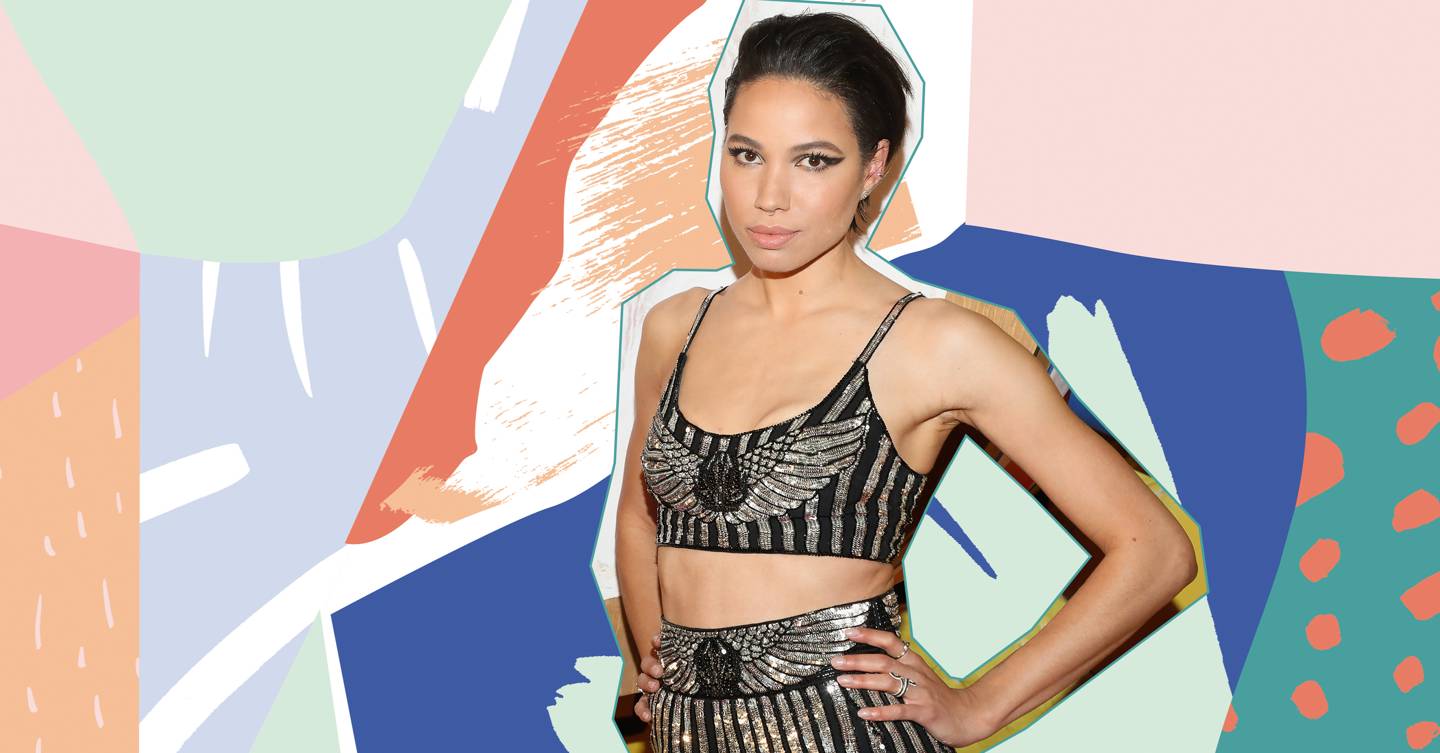I first met Jurnee Smollett on the set of the GLAMOUR Birds of Prey cover shoot alongside her co-stars. She had me in stitches within seconds over many a banana euphemism but over the next three times I have met her – both IRL and virtually – I have learnt that Jurnee is more than funny, she’s nothing short of everything. As a fiercely talented and high-kicking empowered woman, Jurnee will serve the tea piping hot on the toughest subjects from the expectations on mothers to the systematic racism that still plagues our society. And it’s this level of direct real talk we have long needed.
WATCH: Jurnee powerfully discusses motherhood & racism in this week’s GLAMOUR UNFILTERED hosted by Josh Smith
Here, as she stars in Lovecraft Country, the new HBO horror TV show set in the 1950s that puts a largely black cast at the centre of the story (finally!), Jurnee opens up about the everyday racism she has had to face in her life and how pouring trauma into her work takes on new meaning as she raises her son, Hunter…
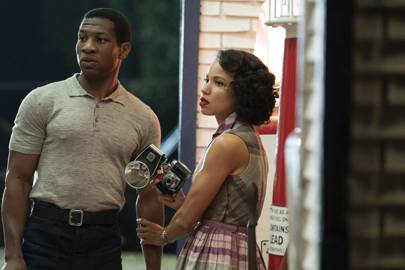
Lovecraft Country is like nothing else on TV, you just don’t know what to expect next, you think it’s going to be a period drama and then BAM there’s monsters and a sci-fi twist! What did you think when you first got the script?
The thing I love so much about Lovecraft is it really deconstructs this classic genre and re-imagines it in such a radical, bold and audacious way. As a black actress, as a woman of colour, I’m such a fan of sci-fi and horror and thriller since I was young. I remember seeing Silence of the Lambs and being terrified when I was 10 years old of Hannibal Lecter – but loving it! But I felt for most of my career that I was just shut out from this genre, because so often we are written as, ‘the black chick that’s killed in the first act.’ As an artist, it’s just not very satisfying to play those roles. When I read this, that’s why for so many reasons, I just had to be a part of it.
What do you think have been some of the most triggering hurdles you have had to overcome to get to this point in your career?
Art is powerful, representation matters. Where we are as an industry for women of all kinds is abysmal, but particularly for women, black and brown women, women of colour. Me and my peers have very similar hurdles just in having access to equal opportunities, to having rich stories, to having women who are written in a way in which you’re not just the girlfriend, you’re not just there to help push his plot point out, or the best friend. To have characters in which they’re living, breathing, flesh, human beings who have desires, who are flawed, who have strengths, but also weaknesses, who do very questionable things, who aren’t always the best person or who have these different dynamics, these contradictions. As an artist, it’s so rare that you get access to scripts that are written that way.
I think a lot of the problem has to do with the fact that women of colour have been shut out so much from the storytelling process in our history at every stage, whether it’s the executive stage or green-lighting a film or producers or directors. According to the Annenberg Institute, something like out of the1300 films made from 2007 to 2019, only 1% were directed by women of colour – that’s 1% of ALL women of colour, mind you. That’s abysmal, Hollywood! There’s just a lot of work we have to do, but I’m so encouraged, because we’re in a point in the industry where there are so many amazing voices, like Misha Green, Gina Prince-Bythewood, Ava Duvernay and Shonda Rhimes. These really powerful storytellers are re-imagining these genres and centering black voices in it. It’s a very encouraging time for me because there are so many fearless storytellers.
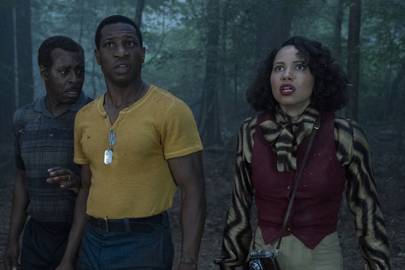
A lot of people will say that Lovecraft Country is a, ‘timely’ show but it isn’t timely, it’s overdue! We needed a show with this level of representation years and years ago. The question is always, ‘did you feel seen growing up,’ but do you even feel ‘seen’ as an adult woman on screen?
I think if you are black and female, the answer to that unfortunately is no. I have battled this erasure of the black female voice in art my entire career. I think as a society, we see how problematic that is. We’re seeing how problematic that is, the rest of the world is just catching up. I do agree with what you’re saying. Lovecraft is so incredibly timely, but when would it have not been timely? If it was released on any week of any month of any years since 1619, the themes explored in our show would be timely, because we haven’t as a nation, as a world, healed from the systemic racism that has plagued us as a society.
With a show like Lovecraft, I think art is so powerful. I think art has the power to shift culture. I don’t think you can see real change effected on a policy level, on a political level without first seeing a shift in culture. What is happening right now in society is a great reckoning. This trauma that we’re witnessing in the street is not new, and our siblings, siblings of all kind, we have to use our voice for them, because if not now, when?
The scene where your character, Leti goes into the café and receives such vile racist treatment really stuck with me. The racial discrimination she faces on a daily level is so extreme, but also there is systematic oppressive racism too. But for you, what kind of everyday racism do you still have to come up against?
It’s true. One thing we explore in Lovecraft is this concept of how black Americans were systematically excluded from the process of just purchasing homes. So even if they had the funds, there were rules in place in the real estate policies, in banking and loan policies that just excluded black Americans from being able to have access to equal housing. We ask, what happens when you are the one that pioneers into an all-white neighbourhood? I can recall growing up, what it felt like. My family and I come from a very big, close family, but there were times in which we were the only black family in the neighbourhood. My mom being black, my dad being Jewish, I remember a fish being put on our lawn the morning of the Million Man March, and I was a kid, but that’s something that forever will stay in your head.
I remember our car being keyed with the N-word. I remember my mom being called it. I remember soda cans being thrown at me and my siblings when we were out jogging. These are memories that you put into your art, and approaching Leti, I went back and did a lot of research of the period of the time, and read a lot of writers, like a James Baldwin, a Gwendolyn Brooks, these great thinkers from that era. One thing you discover is this feeling that I felt growing up, of feeling displaced, is not new.
James Baldwin talks about the shock that you experience as a black American when you know that this is a nation that you owe your identity to, you owe your birthplace, this is your birthplace and yet this nation has not evolved a place for you. And how isolating that is, how lonely that is. So, as an artist, when I take on a project like Lovecraft, it’s incredibly cathartic, because I can pour these memories into it but I also can call up on the ancestors and felt them very strongly every step of the way.

Getty Images
Do you think pouring that trauma that you have personally faced and your ancestors faced onto the screen, takes on a new meaning now that you’re a mother as well?
Absolutely. I remember I wasn’t a mother when Trayvon Martin was killed, but I do remember the feeling of connecting to Sybrina, and the pain she felt, that as a mother, she has to bury her child. So many black boys who have been robbed from us. I know what it’s like to witness a family member, a brother, a friend, put in the back of a police car. I know what it’s like to be put in the back of a police car for no reason and harassed. These are things that I’m aware of and so it’s not lost upon me that I am raising a black son in America. While I bust my ass to be able to provide him a life, to protect him, you cannot buy yourself out of oppression.
You cannot buy yourself out of racism. It’s just not possible. You will not be immune. I fight now, I work with people on the front lines and try to assist in the movement in any way I can, because I’m fuelled as a black mom to hope that we can change our world, so that my son doesn’t have to experience those things. He should not have to, when my white female counterparts are not going to have to have the same talks with her son that I will have to.
Your character has to face not only racial discrimination but gender discrimination too…
You know, the patriarchy benefits from white supremacy and white supremacy benefits from the patriarchy, one cannot exist without the other, it feeds off the other. Being someone who lives at the intersection of multiple identities it’s atrocious. But I think as black women we’re the spine of this nation. We’re the backbone of this nation. This nation was built upon our backs. We birthed it. I take such pride in the Queens that I stand upon. I come from royalty and it pours through my veins. One thing I love so much about a character like Leti, is women like Leti had this real inner dignity that you could not take from them. I think of my grandmother, she was a big influence on me in approaching Leti. My grandmother raised four children as a single mom. She was the first black Miss Galveston, a beautiful woman and went to work every single day to clean the homes of white folks. She would do her hair and she would press out her dress.
The dignity that she had in approaching her work, in spite of the fact that they mistreated her, they underpaid her, that they neglected her and abused her, it’s something that’s always stuck with me growing up, hearing these stories about her, is that there is power in that. You just cannot allow society to rob you of your dignity. To say, ‘I am not of lesser value, just because you can’t see my work.’ It’s so powerful. When I think of Leti, I feel like in mythology she would have been like this Virgin Goddess, the one who owns her sexuality and makes her own choices. I had a lot of fun in playing her, because she is such a disruptor. She’s so defiant, and she’s a bit of a tornado. You don’t get these roles every day.
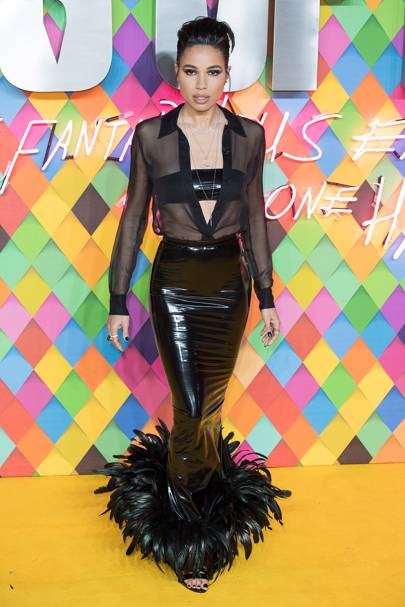
Getty Images
What do you think you’ve learned about yourself through Lovecraft Country?
Oh, I was in a very dark space going into Lovecraft last year. We had already shot the pilot, but I went from Birds of Prey to Lovecraft. I learned a deeper level of resilience. This project required so much of me. It cost me a lot, but it was necessary. It’s very cathartic. There was a lot of pain that I was able to pour into this. I come from resilient people; I just do. Sometimes you set these limits on yourself of like, ‘Ugh, I could never do that,’ or, ‘I could never get past that.’ But then you do, and life goes on and you’re still standing. I’m still here. I survived.
You always show up! You are always putting yourself through it physically and mentally on screen…
Thank you so much – it is hard. We, as women, put such pressure on ourselves to do it all and be it all. I did also learn about the levels of pressure I was putting on myself. I was still nursing Hunter through the entire season of Lovecraft. I had this real expectation of myself, of what it meant to be a working mom, what it meant to be an artist. I think I’ve learned through this process that I had to ease up a little bit on these standards I had set, especially in my motherhood. Some of it was a little unrealistic and I was killing myself trying to do it all instead of having grace upon myself and being kind to myself. I realised that trying to kill myself was going to serve no one, it wasn’t going to make me a better mom and it didn’t. I was suffering from mom guilt throughout the entire process and thinking, ‘Oh my gosh, I’m nursing him, but I got to go, and I got to go do this scene and I’ve been gone for hours.’ It doesn’t serve my son to have that sort of mentality.
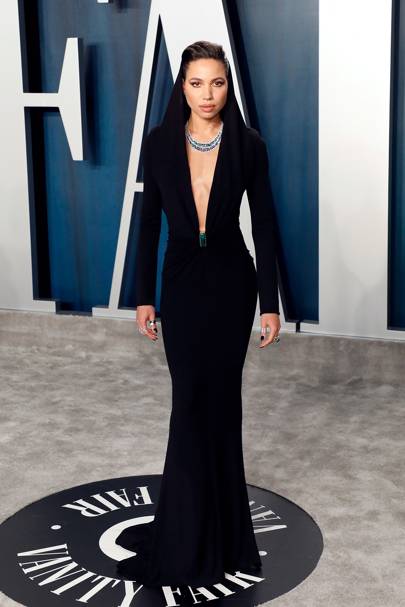
Getty Images
You’ve got to be your own ally and warrior in any given situation, right?
Yeah and I was honestly being my worst critic of course.
If you could be on a Zoom call with the you who was just starting out in acting what advice would you want to give the younger you?
Don’t ask for permission, own your power and be kind to yourself.
Lovecraft Country will be shown every Monday on Sky Atlantic and is available on NOW TV now
